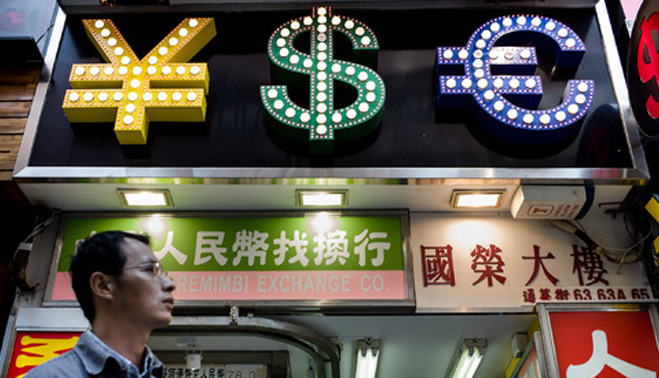![]() Home > World Business
Home > World Business
The Rally in Asian Currencies Won't Last the Year, Say Strategists

![]() June 18th, 2016 | 08:08 AM |
June 18th, 2016 | 08:08 AM | ![]() 1315 views
1315 views
Bloomberg.com
The rally in Asian currencies from January’s seven-year low hasn’t convinced strategists that this newfound strength can last.
Every currency in the region will weaken by year-end, with those of Singapore, Taiwan and South Korea all predicted to drop at least 3 percent, surveys compiled by Bloomberg show. The cost of hedging against losses has climbed for seven straight days, the longest streak in a year. China’s economic slowdown and the Federal Reserve’s bias to consider raising U.S. interest rates will hasten declines, according to Standard Life Investments Ltd. and Societe Generale SA.
“We’re still a little nervous about the prospect for Asian currencies,” said Ken Dickson, Edinburgh-based investment director for currency at Standard Life, which oversees $372 billion. “China’s economy will continue to underperform. For the moment, the Federal Reserve are guiding us that they see rate hikes delayed rather than rate hikes canceled.”
The Bloomberg-JPMorgan Asia Dollar Index jumped as much as 4.4 percent from its low in January to this year’s high in April as traders pushed back bets on higher U.S. borrowing costs. The gauge, which tracks 10 Asian currencies including the Chinese yuan, Indian rupee and South Korean won, has since given up about half those gains and is now little changed this year. It sank 5.6 percent in 2015 amid signs of a slowdown in China.
Growing Headwinds
Analysts say there’s only so long Asian currencies can defy gravity. No matter how well their domestic economies are doing, their long-term direction will always be determined by bigger nations like the U.S. and China. Headwinds are growing as the dollar is forecast to be boosted by higher interest rates, and a sagging Chinese economy weighs on demand for Asian exports.
“Deflationary fears, competitiveness issues and weaker long-term growth prospects in China suggests looser monetary policy in the surrounding countries,” Standard Life’s Dickson said. “For much of Asia, the exchange rate is the main expression of this softer policy stance.” The won and Taiwan dollar are likely to be the worst performers, he said.
Singapore’s dollar will weaken 3.7 percent by year-end, Taiwan’s will decline 3.3 percent and the won will slide 3 percent, according to forecast spot returns based on analysts’ predictions compiled by Bloomberg.
Hedging Costs
The costs of hedging against losses in Asian currencies, a way of measuring bearish sentiment based on risk reversal rates, is again increasing after falling to a 21-month low earlier this month.
The average premium on contracts giving the right to sell nine regional currencies versus those to buy increased for seven days, the longest streak since May 2015. The spread has swelled to 1.52 percentage points from as little as 1.28 on June 8.
“The slide in Asian FX is a fundamental one which will be punctuated by Fed gesturing,” said Aaron Low, Singapore-based principal at hedge fund Lumen Advisors LLC. “We expect to see some kind of wide ranges in risk reversals unless we see clearer resolution either in China or in the Fed’s language.”
Fed Forecasts
While the Fed cut its forecasts this week for how many times it expects to raise rates this year, nine of the 17 policy makers still predict two increases and all expect at least one. Chair Janet Yellen said on Wednesday many members expect to increase rates in the coming years as the headwinds from the financial crisis dissipate further.
The Dollar Index, which tracks the U.S. currency against six major developed peers, has dropped 4.3 percent in 2016 as traders pushed back predictions for when the Fed will act. It is forecast to regain momentum, rising 2.6 percent by Dec. 31, based on the median estimate of analysts surveyed by Bloomberg.
Schroder Investment Management Ltd. says a decision by U.K. voters to exit the European Union at a June 23 referendum may also push down Asian currencies by damping growth in the single-currency region and sapping demand for imports.
“I do think the risk aversion that would come from Europe will be quite strong,” said Rajeev De Mello, who oversees about $10 billion as head of Asian fixed income at Schroder Investment in Singapore. “The problem is the trade angle. If Europe is really going to weaken in the next three to six months, it’s going to be difficult for Asian currencies.”
Societe Generale says emerging-market currencies will struggle in the second half of the year given the worsening outlook for global growth, with Asia performing worse due to lower bond yields and its sensitivity to China.
“A perfect storm of Fed policy uncertainty, renminbi depreciation and China hard-landing fears buffeted emerging-market currencies in 2015,” said Jason Daw, head of Asian currency strategy at Societe Generale in Singapore. “Until the narrative surrounding emerging markets improves, rallies will be temporary, shallow and ultimately unsustainable.”
Source:
courtesy of BLOOMBERG
by Lilian Karunungan
If you have any stories or news that you would like to share with the global online community, please feel free to share it with us by contacting us directly at [email protected]